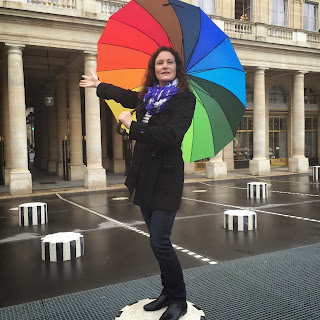It lasted an hour.
I had to call my husband to tell him "Soren is missing." Let that sink in. Let that guilt percolate. How do you tell a father that you let his kid go missing? Yeah.
I called 911. They had to search our house, peeking in all the closets. I had to explain his disability in detail. No sirens or flashing lights, please. They quietly rallied their officers, even the parking enforcement folks. Silently. Everybody searched so quietly. Like Soren.
The neighbors wandered outside to see why there was a barefoot and distraught mom pacing. Even in frosty Seattle, they rallied.
The neighbors found my son. They found him. Alive alive alive alive.
He was wading in the waters of Green Lake, two blocks and a busy street away from our house. Drenched and happy.
He had ridden his scooter up the hill, probably to where we practice ordering hot chocolate with his iPad. He had crossed an incredibly busy street at rush hour. He was in the water and can't really swim.
He was alone. I'm not sure if he was lost.
What if. Indulge me while I spell out what goes through a mom's head: What if he's hit by a car. What if he drowned. What if he's hiding. What if he's scared. What if someone picked him up. What if he's terrified. What if he's dead.
And then odd thoughts that I'm embarrassed to remember now: Well, it finally happened. I can't believe I'm not wearing a bra let alone shoes. Should I sit down or stand up? Why am I so calm? What is wrong with me? I should be screaming. What should I do? Please someone, tell me what to do. I need a script. Like Soren.
I self-medicated that night. I just didn't want to sit with the what-ifs anymore. And the truth was that I had been through this scenario in my head. Erik and I had both imagined this situation multiple times before. Almost like we were waiting for when it would happen. Our worst fear fulfilled.
You know the stats, right?
- Drowning is among the leading causes of death of individuals with autism.
- Roughly half of children with autism attempt to "elope" from a safe environment, a rate almost four times higher than their typical siblings.
- In 2009-2011, accidental drowning accounted for 91% total U.S. deaths reported in children with autism ages 14 and younger subsequent to wandering/elopement. Of those deaths, 68% were from drowning in a nearby pond, lake, creek, or river.
- Two in three parents of elopers reported their missing children had a “close call” with a traffic injury.
- 32% of parents reported a “close call” with a possible drowning.
- Children with autism are eight times more likely to elope between the ages of 7 and 10 than their typically developing siblings.
- Half of all children with autism will run away and potentially go missing at least once before their 17th birthday.
I knew these stats. I sucked them in after every news story of an autistic child gone missing and almost always found dead in the nearby water. To be honest, in that hour that Soren was gone, I felt a nauseating resignation that our fate had already been decided, and this was just our time.
--
After we knew he he was safe and found, but before Erik brought him home, a police officer asked how I was going to address the situation with Soren. What? What a weird question. But I get it now. Was I going to punish him? And no. The answer is no. We talked about it with Soren, but we didn't make what he did sound scary or naughty. He's curious. He didn't do this to be defiant. He did it because the situation availed itself. So we stressed how when he wants to go to the lake, or on a walk (or anywhere, dear God), he needs to ask us.
Then we will go. Together. Please God, together.




















